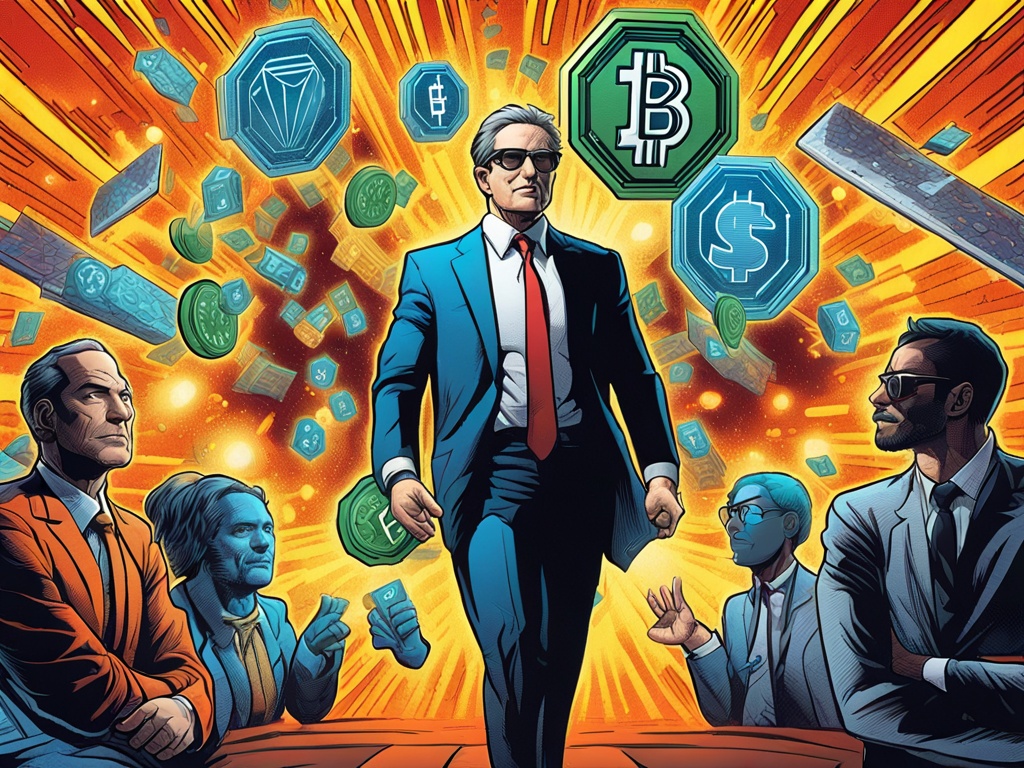The Ripple Effects of FDIC’s Crypto-Stance: What It Means for the Future of Bitcoin and Banks
Imagine you’re at a lively dinner party and the conversation shifts to cryptocurrency. You know a bit—maybe you’ve dabbled in Bitcoin or heard friends talk about it. Then someone mentions the Federal Deposit Insurance Corporation (FDIC) asking banks to hit pause on their Bitcoin services until new guidelines are established. Your interest piques, but confusion creeps in. What’s going on? Should we panic or is this just another bump on the crypto rollercoaster?
Recently, Coinbase revealed that the FDIC is urging banks to suspend their various cryptocurrency services, including transactions linked to Bitcoin, until they can sort out new regulatory frameworks. This directive has sparked a whirlwind of conversation and debate in the crypto sphere. I’ll break down what this means for you, as a potential investor, and for the cryptocurrency market as a whole.
Key Takeaways:
- FDIC’s Pause Instructions: The FDIC is advising banks to halt all crypto asset-related activities while they finalize new regulations.
- Concerns About Market Impact: This could bring significant uncertainty and potential disruption to the crypto market and those invested in it.
- Calls for Advocacy: Industry leaders are pushing back against what they describe as regulatory overreach reminiscent of past practices that stifled innovation.
- Legal Challenges: Coinbase’s leadership is exploring legal avenues to contest these FDIC instructions, hoping for a judicial rebuke.
- Comparison to Past Regulatory Actions: Critics liken the FDIC’s approach to "Operation Chokepoint," which targeted specific industries through indirect financial pressure.
The Pause on Crypto Activities: A Double-Edged Sword
On one hand, many investors have been supportive of regulatory frameworks, believing they can foster a safer environment for crypto transactions. After all, who doesn’t want to avoid scams and pump-and-dump schemes? But then you have the other side. Investors fear that too much regulation could stifle innovation and hamper the dynamic nature of the cryptocurrency market.
To put it in relatable terms, think of it this way: it’s as if the government told craft breweries to pause brewing while they review new laws about alcohol production. Sure, the intention might be to ensure safety and standards, but it could also heavily impact those small businesses that thrive on creativity and innovation.
A Bit of Historical Context
Coinbase’s Chief Legal Officer, Paul Grewal, recently articulated concerns about the FDIC’s approach. It’s been likened to “Operation Chokepoint,” a controversial campaign where regulators applied indirect pressure on banks to restrict lending to specific sectors like payday loans. Now, the banking sector seems to be experiencing similar sentiments regarding cryptocurrency.
Imagine the hustle and bustle of a farmer’s market, where each stall represents a different small business. If unseen forces started to push certain vendors out, we’d see innovation stifled and fewer choices for consumers. The same can be said about the FDIC’s current stance on cryptocurrencies. Investors and firms could feel squeezed out of an exciting market filled with opportunities.
The Fallout for Banks and Bitcoin
This regulatory pause is creating ripples through the banking system. Banks, traditionally slow to embrace cryptocurrencies, now have another reason to hold back. They’re weighing the risks and benefits, which typically translates into tighter lending practices for crypto-related businesses.
From an investment perspective, this could lead to a more cautious environment. If banks are uninspired or outright fearful about offering services tied to cryptocurrencies, we could see a dip in Bitcoin transaction volumes and possibly its price. But here’s the kicker: while some investors might run for the hills at first sign of regulatory shadow, history shows that market dynamics can often recover and adapt to change.
Standing Up to Overreach—The Investor’s Ally
The responses from industry leaders have ranged from concern to outright defiance. Coinbase’s CEO, Brian Armstrong, has even suggested that these regulatory moves might not hold up in a court of law, arguing that it’s unconstitutional for regulatory bodies to create laws instead of enforcing existing ones.
Here’s a thought for you. Think about the many innovations that were once seen as too radical—photography, the internet, even personal computers were once doubted. But through persistence and advocacy, they found their footing. So, if you’re feeling a bit apprehensive, remember that the path for progress is often messy and requires resilience from both innovators and investors.
Industry Voices and Action
Prominent voices in crypto, such as attorney John Deaton, have stepped forward to champion the need for an investigation into these regulatory pressures. The sentiment is clear: the aim shouldn’t be to pick winners and losers, but to foster a fair, open market where everyone has an equal shot.
This is reminiscent of titanic clashes in various sectors. For instance, in the finance world, we’ve seen that when traditional systems feel threatened by innovation, they often rally together to protect the status quo—for better or worse. So, it’s hard not to see the broader implications here: a potential standoff between innovation and regulation.
A Future of Uncertainty or Opportunity?
At the end of the day, this situation forces us to grapple with some deep questions about the future of finance, innovation, and personal freedom in this digital age. Are we okay with a landscape where regulatory bodies dictate economic directions, or do we believe in self-driven innovation despite the chaos?
As potential investors, it’s prudent to stay informed and reflective. The cryptocurrency market is a wild ride, and these regulatory developments are just part of the ongoing story. Will this regulatory pause lead to a more stable, secure environment for crypto, or will it stifle the very innovation we all hope to see flourish?
If you find this all intriguing and want to dive deeper, consider these key phrases:
FDIC Bitcoin Services, Coinbase Reveals, Operation Chokepoint.
In the grand scheme of things, one might wonder: is this moment a stumbling block or a stepping stone for the future of cryptocurrency?




 By
By
 By
By


 By
By
 By
By